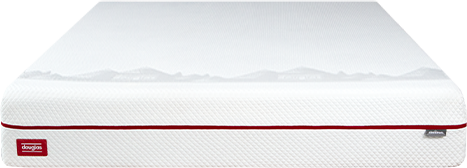Standard Pillow Sizes: Your Complete Guide to Pillow Dimensions (2025)
Updated: March 31, 2025 | Published: August 30, 2024Whether you sleep with a mountain of pillows on your bed or with just one, you’ve likely encountered various pillow shapes and sizes. Different pillow dimensions may better suit your bed depending on your mattress size.
In this article, we’ll discuss standard pillow sizes, their matching pillowcase dimensions, and help you determine which pillow size will best suit your needs.
Size Chart: Common Pillow Sizes

| Pillow Size | Dimensions |
|---|---|
Standard Pillow Size | 20 x 26″ (51 x 66 cm) |
Super Standard Size | 20 x 28″ (51 x 71 cm) |
Queen Pillow Size | 20 x 30″ (51 x 76 cm) |
King Pillow Size | 20 x 36″ (51 x 92 cm) |
Body Pillow Size | 20 x 54″ (51 x 137 cm) |
Throw Pillow | Varies |
Euro Sham | 20 x 20″ (51 x 51 cm) |
Travel Pillow | 12 x 16″ (30 x 41 cm) |
Orthopedic Pillow | 14 x 24″ (36 x 61 cm) |
Pregnancy Pillow | 20–30 x 54–60″ (51–76 x 137–152 cm) |
Standard Size
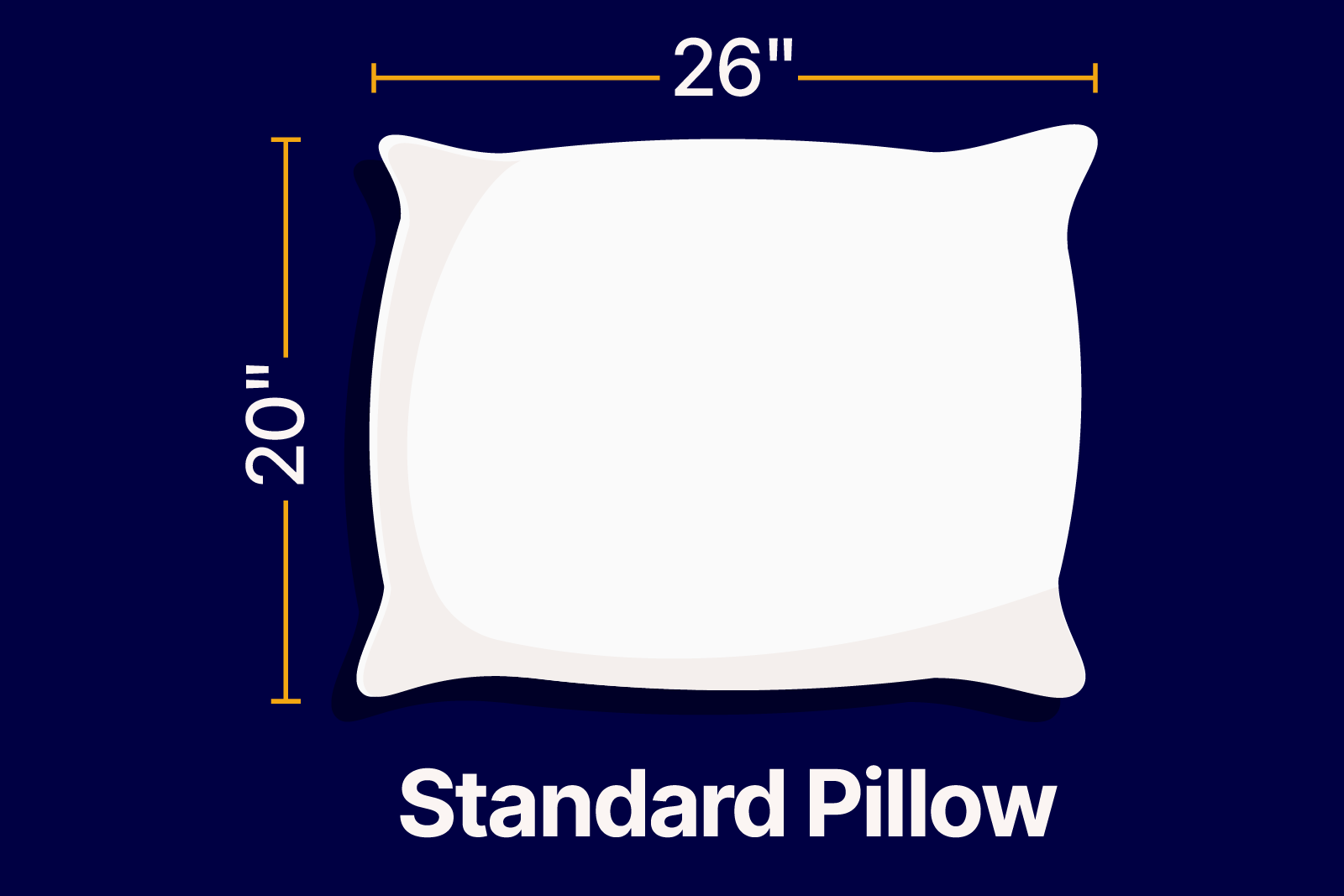
A standard pillow size typically measures 20 x 26″, or 51 x 66 cm. This is the most common pillow size, and likely is what you visualize when the word “pillow” comes to mind.
If you have a twin or twin XL mattress, one standard-size pillow will fit well. Two standard pillows will fit perfectly on a full mattress, but it would take three of them to fill the width of a king. This is where sizing up to a larger pillow size may better suit your sleeping needs.
Super Standard Size
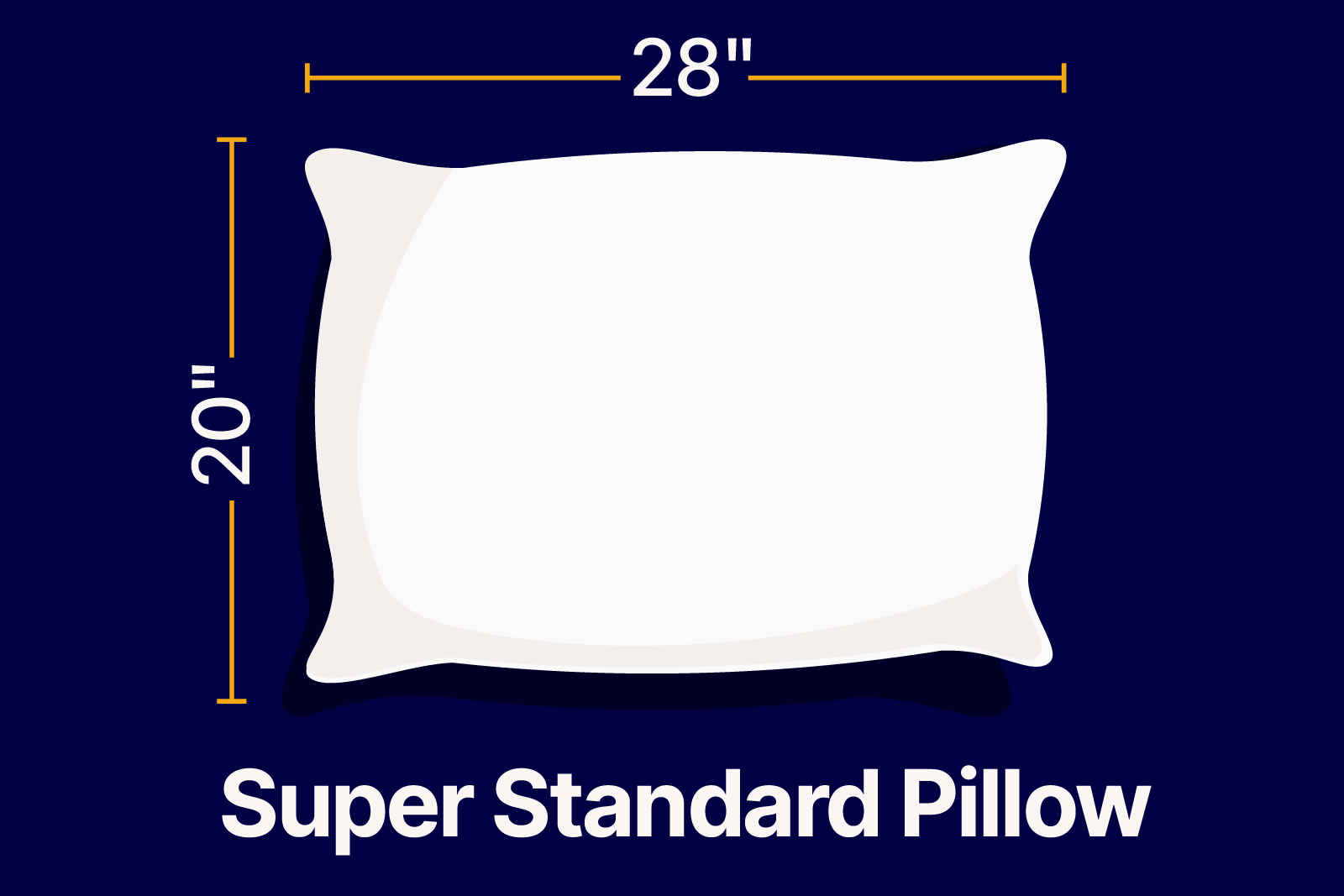
Typically measuring 20 x 28″ or 51 x 71 cm, a super standard pillow is just what it sounds like—a pillow slightly longer than a standard size. Super standards, like their shorter counterparts, will fit well on a twin, twin XL, or full bed when used alone.
Using two super standards on a full mattress would result in some overhang. You’ll be able to fit both super standards on a queen-size mattress instead.
READ MORE: Full vs queen mattress
Queen Size
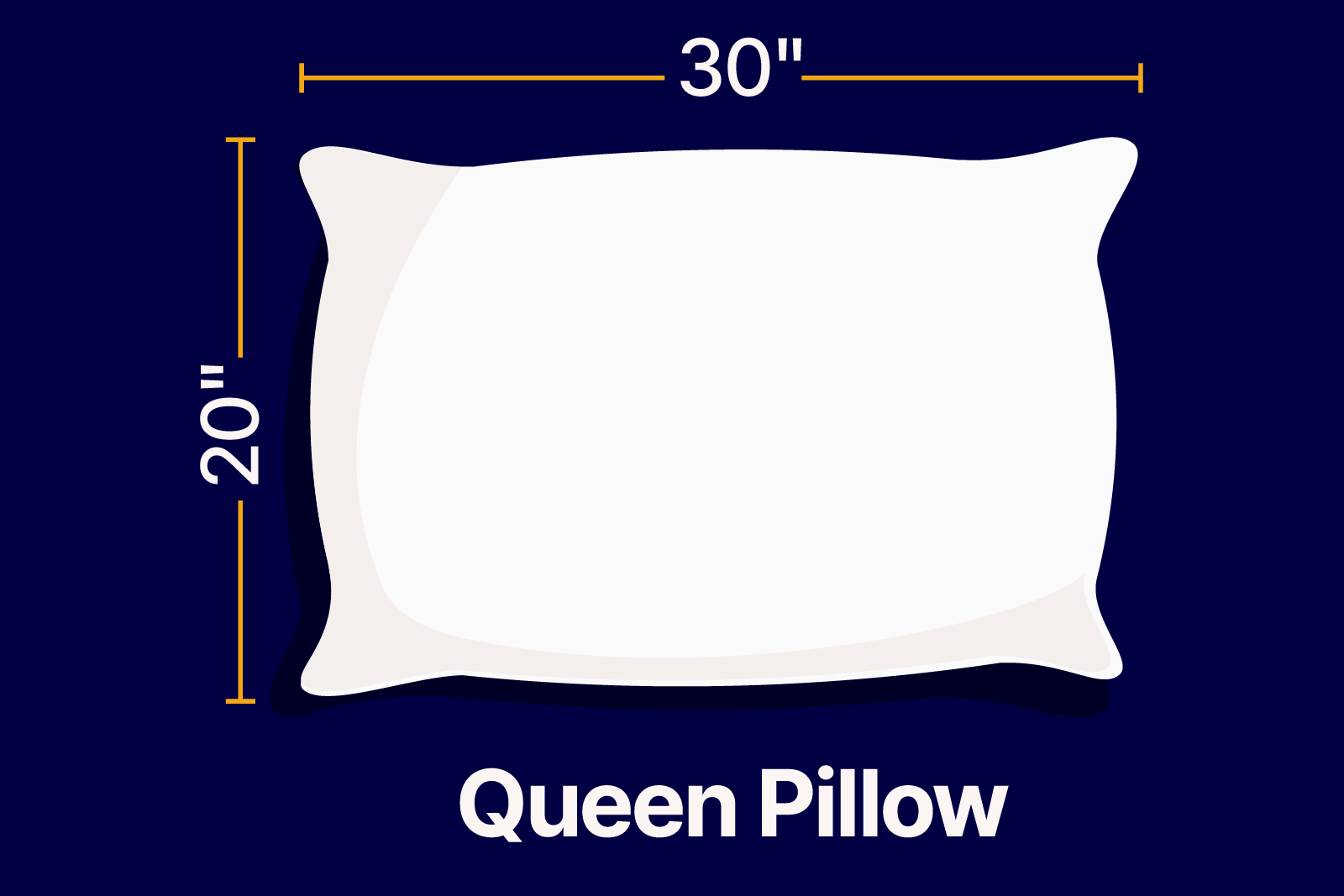
A queen-size pillow is the next step up in pillow size, and as the name suggests, the dimensions work perfectly on queen mattresses. With standard measurements of 20 x 30″ or 51 x 76 cm, two queen-size pillows side by side will fill a queen mattress perfectly.
Standard pillowcases typically measure 20 x 30″, so you shouldn’t need to buy special pillowcases for this pillow size.
King Size
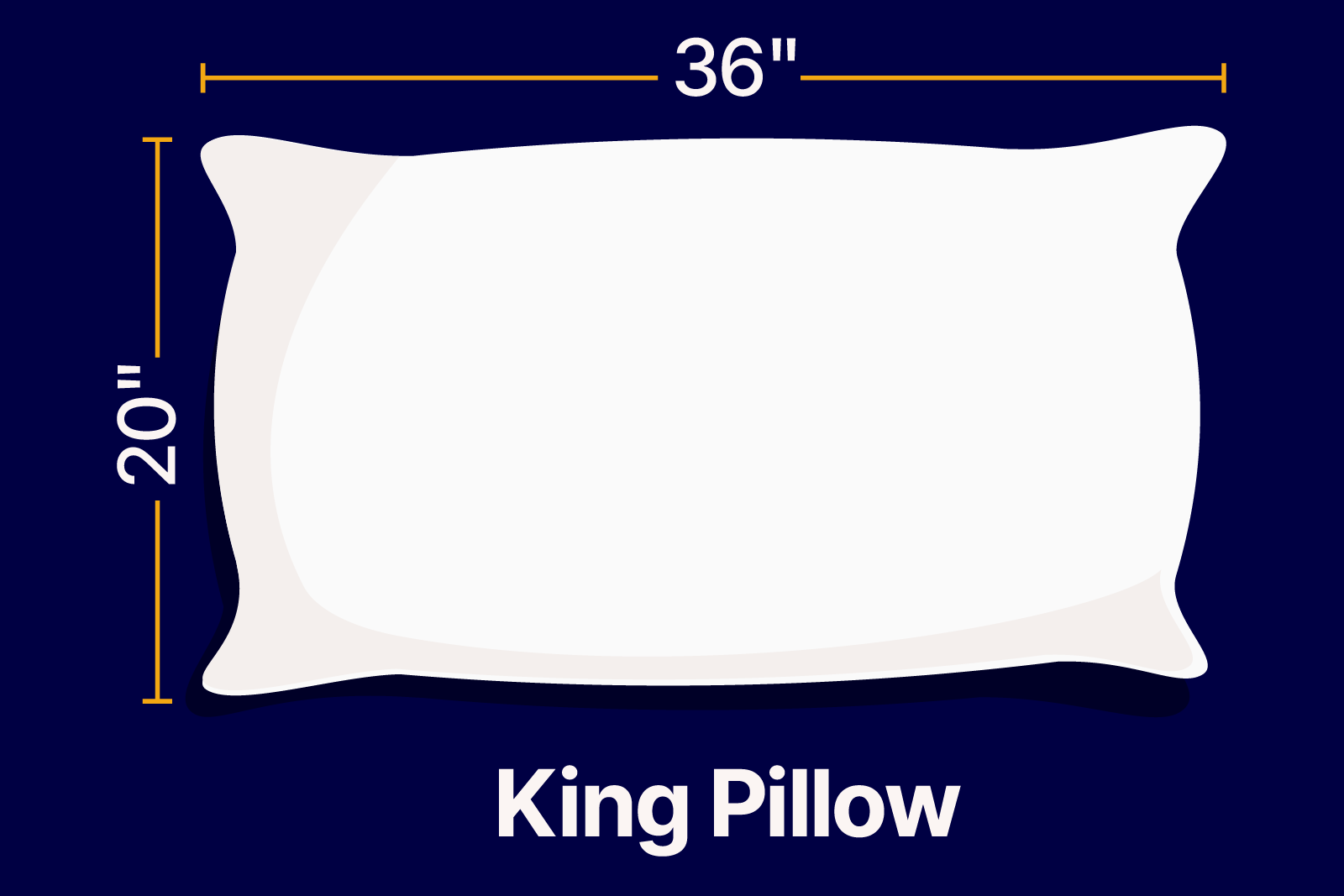
With a bigger step up in size, king-size pillows are noticeably larger than the previously listed dimensions. With a typical king pillow measuring 20 x 36″ or 51 x 92 cm, you’ll need a longer pillowcase than standard ones to accommodate the additional width.
King pillows fit well on king or California king mattresses, but will fit snugly on a twin mattress if you prefer to sleep with a single pillow.
Body Pillow Size
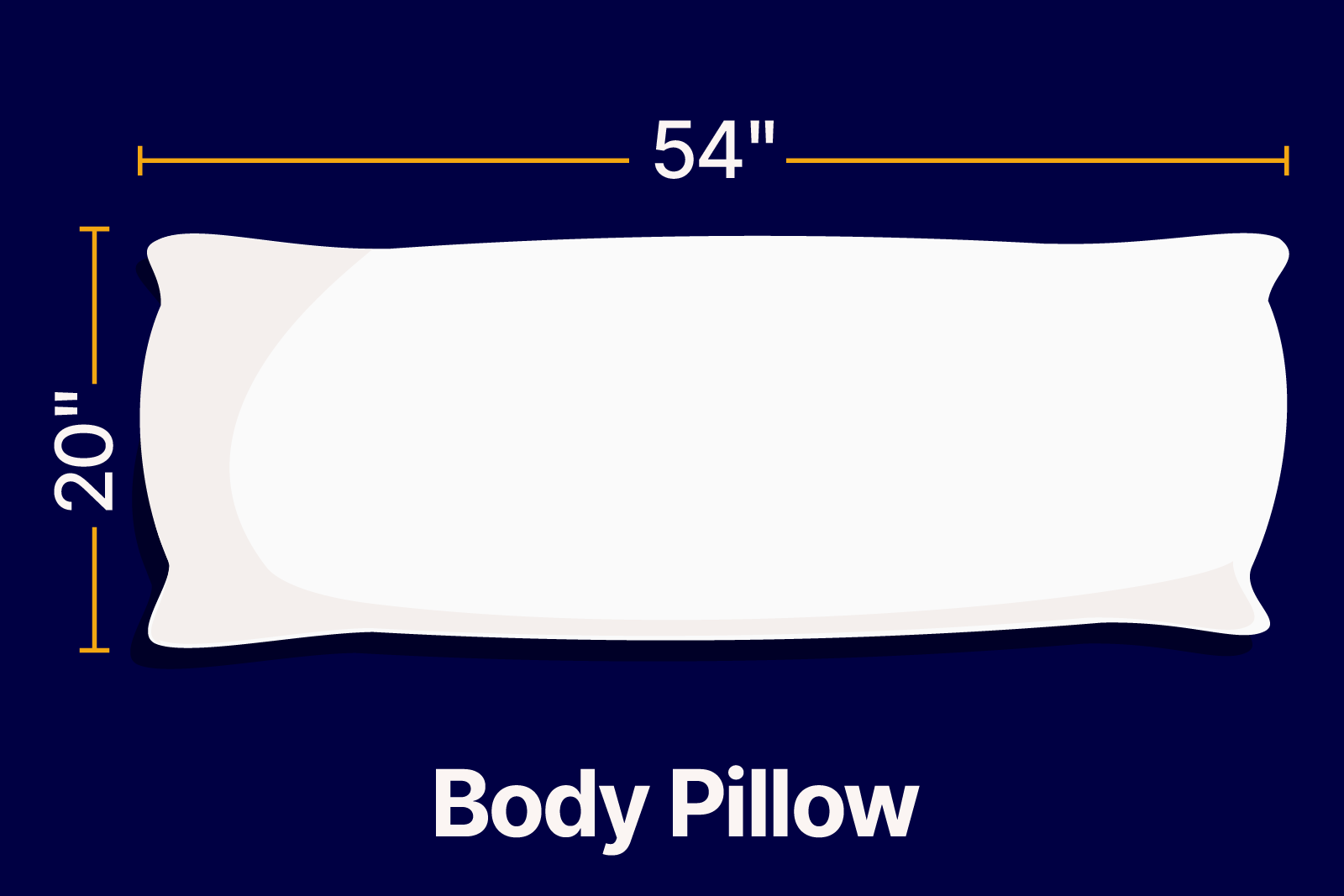
While body pillows are typically associated with pregnancy, they can be used by any sleeper. Body pillow sizes vary, but a standard measurement is 20 x 54″, or 51 x 137 cm. Some body pillows don’t require a pillowcase, but if you’d like a cover on your body pillow for easier laundering, you’ll need one that’s made specifically to accommodate this length.
Specialty Pillows
Throw Pillows
Throw pillows come in all shapes and sizes, and are typically used for decorative purposes. A common throw pillow size is lumbar, which measures 12 x 24″, or 30 x 61 cm, and is often used as an accent pillow at the front of the bed.
Euro Sham Pillow
A Euro Sham pillow is a type of throw pillow that is typically square in dimension. These pillows can be any size, but will have the same width and length, whether it’s 20 x 20″ or 24″ x 24″.
Travel Pillow
Travel pillows are used to sleep when on-the-go in cars or planes, and can take rectangular or C shapes. Common dimensions are 12 x 16″, or 30 x 41 cm.
Orthopedic Pillow
There are a wide variety of orthopedic pillows available to help correct body positioning while lying in bed. Standard orthopedic pillows measure 14 x 24″, or 36 x 61 cm, but you should consult your doctor or chiropractor to determine what size will work best for you.
Pregnancy Pillow
Pregnancy pillows are a type of body pillow. They come in a wide variety of shapes and sizes, but the dimensions of standard pregnancy pillows typically range from 20–30 x 54–60″ or 51–76 x 137–152 cm.
Frequently Asked Questions
What is pillow loft?
“Loft” is the compressed height or thickness of a pillow when your head is resting on it. Depending on what kind of sleeper you are, different lofts may suit you better.
Typically, pillows are categorized into three different lofts: low, medium, and high. The loft is determined by the amount or density of filling within the casing. A pillow’s material or type can also play a role in determining its loft.
For example, side sleepers typically tend to prefer a pillow with a greater/higher loft, as sleeping on your shoulder requires your neck to be higher to achieve spinal alignment.
Everyone has their own preferences when it comes to pillow loft. Adjustable foam pillows are the perfect way to customize your sleep experience. Simply remove or add foam filling to adjust the loft to match your unique sleeping style.
What types of pillows are there?
There are a number of different pillows made of various materials, each with its own benefits. As every sleeper is different, the best types of pillows could vary from person to person. Some popular types of pillows include:
- Down alternative
- Down
- Memory foam
- Shredded memory foam
- Gel
- Feather
- Cotton
- Polyester
- Bamboo
- Latex
- Wool
- Buckwheat
- Microbead
- Kapok
How do you measure a pillow?
Use a measuring tape to measure the length (long side) and width (short side) of your pillow from seam to seam. This should tell you the minimum dimensions required for an adequate pillowcase size.
Most pillowcases are designed to accommodate for variations in a pillow’s length, so you likely shouldn’t have an issue finding a pillowcase that fits.
What is a pillow gusset?
A gusset is a panel of material that provides shape and structure to a pillow and offers extra support for sleep. A gusseted pillow has a strip of material around the perimeter.
Gusseted pillows can allow for more filling and are typically loftier than standard pillows. Between the extra filling and the additional support provided, having a pillow with a gusset can help prevent flattening over time.
The Douglas Adjustable Memory Foam Pillow is gusseted and can account for a large amount of filling. This makes it capable of having a high loft.

Do I have to use a pillowcase?
It’s always a good idea to use a pillowcase with your pillows. Not only will it help extend the life of your pillows, but it’s also more hygienic. Our faces and heads are covered with oil and dead skin cells that can easily transfer to your pillow if a case isn’t used.
Even if you shower right before bed, your pillowcases and sheets can accumulate products you are putting on your face and hair. Dust is also accumulating on your pillows while you’re not sleeping on them. Washing your bedding will make it easier to breathe clearly while you sleep.
You should wash your pillowcases, fitted sheet, and top sheet every week. Because pillowcases are directly in contact with your body while you sleep, you should clean them regularly to prevent stains, oil, and dirt buildup and keep your bedding clean. Using pillowcases makes laundering your bedding that much easier.
What pillowcase size do I need?
Your pillowcase size will be determined by your pillow size, which is often determined by the size of your mattress. Pillowcases are often 4 or more inches larger than the pillow inserts they’re made for, which is done to accommodate variations in pillow size and loft.
Common pillowcase sizes include:
- 20 x 30″/ 51 x 76 cm: Fits Standard, Super Standard, and Queen pillows
- 20 x 36″ / 51 x 92 cm: Fits Queen and King pillows
- 20 x 40″ / 102 x 152 cm: Fits King pillows
The ideal pillowcase material will depend on your specific sleep preferences. Pillowcases with different thread counts should be considered based on your sleep priorities, like breathability and texture.
READ MORE: What’s the best material for bed sheets?
How often should I wash my pillowcase?
You should wash your pillowcases every week, along with your fitted and top sheets. Being in direct contact with your pillowcases means they should be washed more often than things like your duvet cover or insert.
Cleaning your sheets every week, including your pillowcases, will help promote good hygiene, make them smell better and fresher, and ultimately help you sleep better.
READ MORE: How often should you wash your sheets?
Are pillows machine washable?
While some pillows are machine washable, others are more delicate and will need to be spot-cleaned. Whether your pillow can be machine-washed will be determined by its construction materials.
Instructions on how best to clean your pillow should be listed on your pillow’s law label. Be sure to read your label carefully before attempting to wash it, so you can ensure the longevity of your pillow.
By using a pillowcase and washing your bedding, you shouldn’t need to wash your pillows as often.
What is a pillow sham?
Pillow shams look and perform very similarly to pillowcases. Shams are pillow covers that are more often used for decorative purposes. While pillowcases typically have an opening on one end, the opening in shams is often on the back.
Shams are often designed to look nice, but at the expense of comfort. Most sleepers place pillows with shams at the front of the bed for a cohesive appearance and then sleep on the more comfortable, cased pillows.
What is a pillow protector?
A pillow protector is a sleeve that goes around your pillow, similar to a pillowcase, but is often made of waterproof materials. They’re made to go under pillowcases, so don’t often feature fancy colours or designs.
Pillow protectors are beneficial as they help protect pillows from sweat, stains, and oil, keeping them fresher for longer. Instead of needing to launder your whole pillow, you can wash your pillow protector and pillowcases. Pillow protectors also prevent pillows from being exposed to dust and other allergens.
You should wash your pillow protector every month or so, as long as you’re using it with a pillowcase.
(Get a free sleep bundle, including pillow protector(s), when you purchase a Douglas mattress.)
What pillows should I buy?
There are a variety of different pillow types and sizes available, with various lofts and materials to fit your specific needs. Hopefully, the information in this article helped you discover what size pillow and pillowcase is ideal for your perfect sleep setup.
Our sleep experts at MattressReviews.ca have reviewed and ranked the best pillows in Canada. Here are some of our top choices from Douglas:
- The Cooling Gel Memory Foam Pillows are every hot sleeper’s dream. With a cooling gel layer and pressure-point relieving memory foam, these pillows will contour perfectly to your neck for a temperature-regulated and restful sleep.
- Down Alternative Pillows are the perfect low-to-mid-loft pillows to gently cushion your neck. They are made from vegan-friendly and recycled materials, making them the perfect option for eco-conscious shoppers looking to get a great night’s sleep.
- The Adjustable Memory Foam Pillows are the ultimate tool for a perfectly customized sleep. These gusseted pillows can have a high, medium, or low loft depending on your sleep preferences. Simply add or remove your desired amount of foam, and enjoy.
Our goal is to provide the information you need to find the mattress that’s right for you. Get started with some of our most popular mattress shopping resources:
- Best Mattress Guides: Best Mattress Canada, Best Mattress In a Box
- Reviews: Douglas Original, Logan & Cove Choice, Juno, Octave Vista
- Comparisons: Douglas vs Endy, Douglas vs Casper
We use independent, third-party engineering firms (commissioned by us) with the APEGA stamp of approval to conduct mattress testing on our behalf, using publicly available data. We review and test all mattresses on 40+ criteria we think are important to you, including price, country of manufacture, sleep trial, warranty, features, materials used, motion isolation and edge support ratings, customer satisfaction reviews, returns, and refunds.
